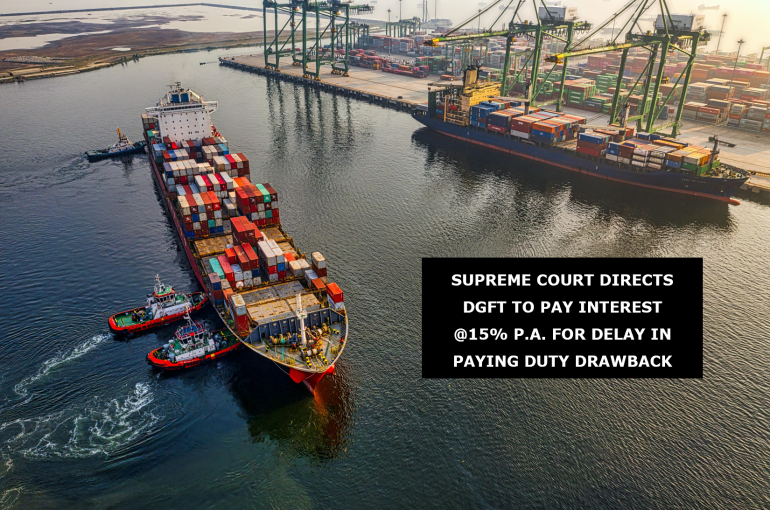SUPREME COURT DIRECTS DGFT TO PAY INTEREST @15% P.A. FOR DELAY IN PAYING DUTY DRAWBACK
In a recent matter that was decided by the Hon’ble Supreme Court of India on 05-02-2024 titled as Union Of India and Ors. vs. M/s. B.T. Patil and Sons Belgaum (Construction) Pvt. Ltd., Civil Appeal No.7238 of 2009, the Supreme Court allowed the Respondent, a Class-I contractor, interest for delayed payment by the Director General of Foreign Trade (DGFT).
This case is important as invariably when we fight litigations against the Government Departments, there is a complete apathy on the part of these bodies when it comes to paying refunds or incentives or compensation for the delay caused by them. While in the case of private parties, one can protect oneself by entering into a contract where a penalty clause can be inserted for delay caused by the concerned party, but in Government contracts and dealings, this is not always possible.
In a matter pertaining to duty drawback that was to be paid by DGFT to M/s. B.T. Patil and Sons Belgaum (Construction) Pvt. Ltd. (the Respondent), the DGFT dilly-dallied and did not pay the party the duty drawback that it was entitled to, for ‘deemed export of goods’. Left with no option, the Respondent approached a Single Judge Bench of the Delhi High Court stating that they were entitled to the duty drawback as per a Notification dated 05-12-2000. Additionally, they were also entitled to interest for delayed payment of the duty drawback as per the Customs Act 1962, where Section 28AA allows interest in case of delay.
The Single Judge agreed with the Respondent and gave them the relief of duty drawback with 15% interest p.a. on the basis of the following Notifications:
The Judgment was based on the Notification that had been issued by the Customs Department that allowed interest to be paid on delay from 15%-30%. The Central Board of Excise and Customs, vide Notification bearing No.32/1995 (NT) – Customs dated 26-05-1995 had fixed the rate of interest at 15% for the purpose of Section 27A of the Customs Act. Likewise, in exercise of the powers conferred by Section 11BB of the Central Excise Act, the Central Board of Excise and Customs issued a Notification No.22/95-Central Excises (NT) dated 29-05-1995 fixing the rate of interest at 15% per annum for the purposes of the said provision.
Thereafter, DGFT went into Appeal before the Division Bench of the High Court, which also affirmed the Single Judge’s Order. DGFT had no option, but to approach the Supreme Court of India in the above matter.
The point that DGFT urged was that there was no provision for interest on delayed refund of duty drawback on deemed exports under the Exim Policy, 1992-1997. Such provision was introduced only under the Foreign Trade Policy, 2004-2009. Thus, the Respondent was not entitled to interest on delayed refund of duty drawback on deemed exports that occurred in 1996. Further, the refund of duty drawback was paid only due to magnanimity on the part of Central Government and hence, it ought not to be treated as a precedent.
But the Supreme Court observed that the Respondent is entitled to refund of duty drawback as a deemed export under the Duty Drawback Scheme. Although the applications for refund were filed in 1996, but the DGFT’s decision to grant refund of duty drawback was taken belatedly on 07.10.2002.
The Supreme Court further held that the High Court while awarding interest at the rate of 15% per annum, however, did not refer to the aforementioned Notifications and further, did not discuss as to why the rate of interest on the delayed refund should be 15%. Therefore, the Bench held that at the first glance, though the rate of interest awarded by the High Court appeared to be on the higher side and without any reason, it was correct as there was belated refund of the duty drawback to the Respondent and hence, it was entitled to interest at the rate which was fixed by the Central Government at the relevant point of time being 15%.
The Court concluded that the Respondent would be entitled to 15% interest on delayed refund of duty drawback and upheld the High Court Judgment of 22-08-2008 stating that there was no good reason to interfere with the said judgment.
Editor’s Comments
This judgment has set a good precedent for times to come as Government Departments, especially, DGFT has always been laid back and reluctant to release the incentives that exporters are entitled to for reasons best known to them. In fact, in two matters that are being handled by our Office, similar matters are being contested at the Delhi High Court. When exporters who have earned foreign exchange for the country, are deprived of the benefits that they are entitled to, Courts ought to balance the equities by allowing them relief such as interest on delay in refund, or incentives, etc in order to encourage them to continue the export trade.
Harini Daliparthy
Senior Associate
The Indian Lawyer
Edited by
Sushila Ram Varma
Chief Consultant
The Indian Lawyer





































Leave a Reply